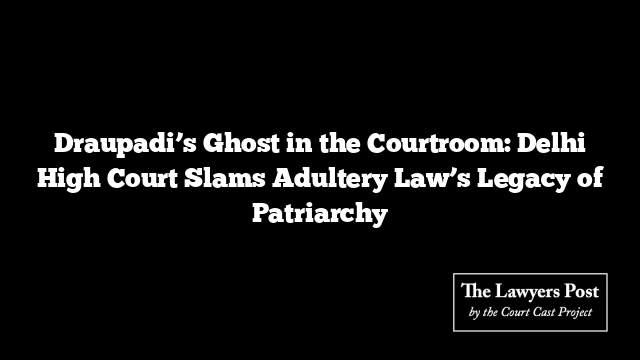In a verdict that felt more like a mirror held up to centuries of gendered injustice, the Delhi High Court has drawn a straight line from the dice game of the Mahabharata to a now-defunct section of Indian law that once treated women like possessions.
While dealing with a 2010 criminal complaint under Section 497 of the Indian Penal Code—a section since erased from the statute books—the Court reminded the nation that Draupadi was not just a mythic figure, but a lasting symbol of how patriarchal societies gamble with women’s dignity.
The case came wrapped in familiar threads: a marriage from 1998, a husband’s discovery of his wife’s alleged affair in 2010, a criminal complaint against the man she was involved with, and a flurry of court proceedings that spanned over a decade. But the heartbeat of the judgment was not just about legal technicalities. It was about how a law, now extinct, had survived far too long on a dangerous assumption—that a married woman was a man’s chattel.
Justice Neena Bansal Krishna, in a judgment delivered on April 17, did not mince words. She invoked Draupadi’s harrowing disrobing in the Mahabharata, betrayed by her own husband and abandoned by her brothers, to call out the deep-seated misogyny that underpinned Section 497.
“Despite such a glaring example of what happens when women are treated as property,” the Court observed, “our society only began to learn its lesson when the Supreme Court struck down this colonial relic in the Joseph Shine case.”
Section 497, before being declared unconstitutional in 2018, criminalized adultery in a way that made only the man in the extramarital relationship liable—provided the woman’s husband hadn’t consented. The woman, in the eyes of the law, had no agency. She was simply a vessel of someone else’s rights.
The case at hand revolved around whether the 2018 ruling that scrapped Section 497 should apply to proceedings from 2010. The Court held firmly that it should—and cited Supreme Court precedent that constitutional rulings apply retrospectively to all pending matters.
As for the evidence? A few late-night calls and a hotel stay in Lucknow were not enough to draw conclusions. “There can be no presumption of sexual intercourse,” the Court noted, wiping out the summoning order against the accused man and discharging him from the case.
What remained at the end of this long legal journey was not just a verdict, but a message: women are not stakes to be placed on a board, not evidence to be presumed, and not property to be claimed.
The dice, this time, didn’t fall in favor of patriarchy.





